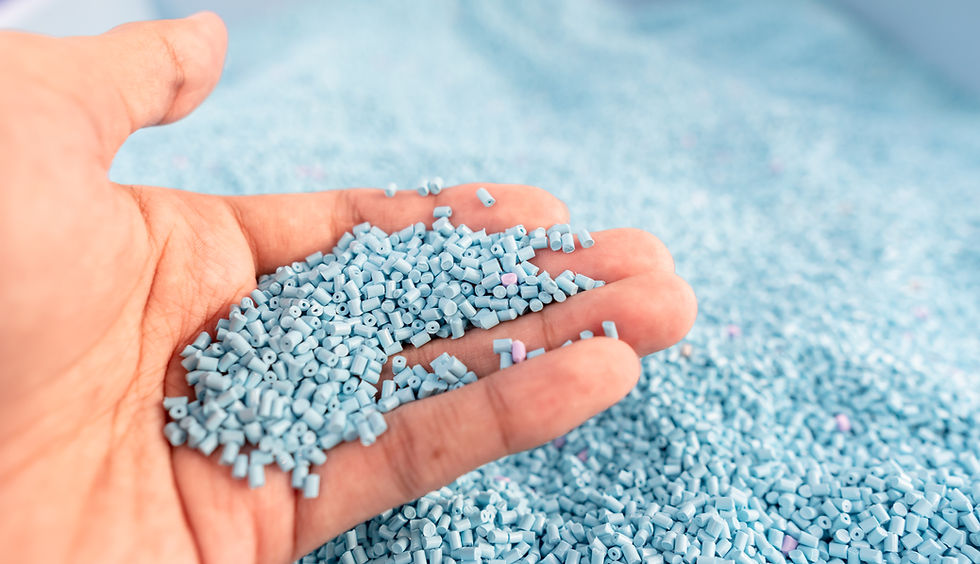ABS and Polycarbonate: The Most Preferred Materials in Plastic Production
- Hap Yazı
- Dec 8, 2024
- 3 min read
The Importance of Material Selection in Plastic Production
Raw materials used in plastic production are of great importance in terms of durability, functionality and aesthetics of the product. ABS plastic and Polycarbonate stand out among the most preferred materials today. Both materials have a wide range of applications with their different properties. In this article, we will discuss the properties and advantages of ABS and Polycarbonate materials and in which sectors they are used.

1. What is ABS Plastic?
ABS (Acrylonitrile Butadiene Styrene) is a durable and flexible thermoplastic formed by combining three different chemicals.
Features of ABS:
Durability: Provides high resistance to impacts.
Lightness: Since it has a low density, it can be easily processed and transported.
Aesthetics: Provides a bright and smooth appearance on the surface.
Processability: Provides ease in molding and injection processes.
Advantages of ABS:
Cost Effectiveness: Reduces production costs.
Chemical Resistance: Resistant to various chemicals.
Recycling: Being recyclable reduces its environmental impact.
Areas of Use of ABS:
Automotive: Instrument panels, bumpers and interior components.
Electronics: TV safes, remote controls.
White Goods: Washing machine and refrigerator internal parts.
Toys: Used in the production of durable toys such as LEGO.
2. What is Polycarbonate?
Polycarbonate is a thermoplastic known for its high durability and transparency. This material, especially preferred instead of glass, combines lightness and durability.
Properties of Polycarbonate:
Transparency: Offers high light transmittance like glass.
Heat Resistance: Resistant to high temperatures.
Impact Resistance: It is very strong against impacts and shocks.
Electrical Insulation: Can be used safely in electrical applications.
Advantages of Polycarbonate:
Lightness: Reduces load when used as a glass alternative.
UV Resistance: Resistant to sunlight in outdoor applications.
Easy Shaping: Provides ease during molding and heat treatment.
Areas of Use of Polycarbonate:
Lighting: LED covers, lenses and diffusers.
Security: Bulletproof glass, protective shields.
Electrical and Electronics: Battery packs, computer components.
Automotive: Headlight guards and interior trims.
3. Comparison of ABS and Polycarbonate
Feature | ABS Plastic | Polycarbonate |
Durability | Middle | High |
Transparency | Low | High |
Heat Resistance | Middle | Very High |
Cost | More Economical | Higher |
Chemical Resistance | High | Middle |
4. Things to Consider When Selecting ABS and Polycarbonate Materials
Area of Use: If you need transparency or impact resistance, Polycarbonate can be preferred, and ABS can be preferred for more economical solutions.
Cost: If cost is a priority in large-scale production, ABS plastic is a more suitable option.
Environmental Conditions: For outdoor use, Polycarbonate is more advantageous due to its UV resistance and high temperature resistance.
Conclusion: The Right Choice in ABS and Polycarbonate Materials
ABS plastic and Polycarbonate are two important raw materials that address different needs in plastic production. ABS stands out with its cost-effectiveness and easy processability, while Polycarbonate is indispensable for many sectors with its durability and transparency. As Ideal Plastic, we offer customized solutions with these materials for your projects. You can contact us for plastic production that suits your needs.
Frequently Asked Questions
1. How to choose between ABS and Polycarbonate? The choice should be made according to the intended use. If impact resistance and transparency are required, Polycarbonate can be preferred, and if cost and aesthetics are priorities, ABS can be preferred.
2. Is polycarbonate environmentally friendly? Polycarbonate is a recyclable material, but the recycling process can be complex.
3. Is ABS plastic durable? Yes, ABS plastic is impact resistant and chemical resistant. These properties make it popular in many industries.




Comments